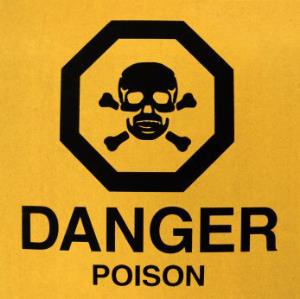
What is poisoning?
Poisoning occurs when your baby comes into contact with a toxic substance by ingesting, inhaling or absorbing it through the skin.
Poisonous gases can be inhaled and there are poisons that can be absorbed through the skin from plants, pesticides or fertilisers. Poisons can also be injected into the body through the bites and stings of insects, ticks, snakes and other animals.
Symptoms of poisoning can develop within minutes, hours or days of your baby being exposed to a toxin. Sometimes there are no serious harm done, or it could be severe and instantly fatal. Often babies and young children may be unable to tell you what they might have consumed to make them so ill. You'll have to look for the tell-tale signs of split medicine containers or bottles. Think back to what your baby last ate.
Types of poisoning
Chemical poisoning
- There are plenty of household products (such as bleach and cleaning detergents) that pose potential poison hazards to your baby.
- Children are often attracted to the colourful chemicals, thinking they're juice.
- Even colourless chemicals might look like water to a young child who knows no better.
- Such chemicals can cause serious damage to the digestive tract if ingested.
- Depending on the chemical, common poisoning symptoms include vomiting (sometimes blood), drowsiness, burning blisters on the lips or in the mouth as well as pain and burning in the chest.
Drug poisoning
- To young children, those colourful over-the-counter or prescription pills look like sweets.
- Everyday mediactions like painkillers or allergy pills and even recreational drugs can be extremely dangerous if swallowed by a young child.
- They can cause symptoms of vomiting, abdominal pain, tremors, sweating, delirium and loss of consciousness.
- Depending on how much of the drug was consumed, poisoning could prove fatal.
Food poisoning
- No matter how hygienic you keep your kitchen area, bacteria and viruses can contaminate your food.
- The most common food poisonings in the home can be attributed to salmonella and ecoli bacteria (found mostly in meat).
- Your child will have vomiting, diarrhoea, stomach cramps, headaches, fever and even drowsiness as a result.
Plant poisoning
- Some leaves and berries are poisonous and could cause tummy cramps or vomiting when consumed in small amounts.
- If eaten in larger amounts poisonous plants may lead to seizures and even death.
Alcohol poisoning
- If a child consumes even a small amount of alcohol, it can make him very sick.
- Your baby may suffer from vomiting, drowsiness and unconsciousness.
- The body may start to lose heat as the blood vessels begin to dilate, leaving him feeling cold.
- A danger is that the child could choke or inhale his own vomit while in an unconscious state.
Gas poisoning
- Carbon monoxide poisoning, for example, can cause headaches and vomiting or render you child unconscious.
- Carbon monoxide is a colourless and odourless gas that can build up in an area from burning fires in closed rooms, rooms with broken heating systems or poor air circulation and closed garages while the motor vehicle is running.
- Other gas poisoning includes carbon dioxide from sewers, chlorine from pools and fumes from household products like glue, paint, cleaners or drugs.
Dealing with poisoning
If you believe your baby has been poisoned, call a poison control centre, doctro or emergency number immediately and follow their instructions. If your child is unconscious, call for an ambulance right away. Put your child in the recovery position. This is a first aid technique that prevents obstruction of the airway.
The victim is positioned on his side with his lower leg bent and one arm stretched out for support. Tilt his head back to keep the airway open. For an infant, cradle him in your arms, with his head tilted downwards to prevent him choking on his own tongue or inhaling his own vomit. Check on your child's breathing and vital signs until medical help arrives.
Keep the substance your child swallowed to show to the paramedics or doctor. They will also want to know how much your baby weighs.It's best not to induce vomiting with Ipepac syrupor other medications unless advised by a medical professional. Do not induce vomiting if your baby has swallowed acid, bleach or any other corrosive substance. Only if recommended by a doctor should you give your child milk or any other fluids.
In the event of gas poisoning, immediately remove the child from the polluted gas environment and into fesh air, unbutton clothing and administer CPR to stimulate breathing. If toxic substances splash into your baby's eye, wash out with a stream of water before medical help arrives. Likewise if it gets on the skin.
For a bee sting, remove the stinger from the skin and wash the area with warm soapy water and apply an ice pack. In the event of breathing difficulties following any sting or bite seek medical attention urgently.
Help prevent accidental poisonings:
- Keep all potentially toxic substances out of reach of children and under lock and key, whether in the kitchen, bathroom or bedroom. These include household detergents and medications to cosmetics and mercury batteries, as well as vitamins rich in iron, lead-based paint, kerosene, lighter fluid, weed killer and insecticides.
- Remove poisonous plants from your home.
- Do not leave bug or rat poisons on the floor.
- Make sure alcohol is locked away.
- Never use familiar containers like cooldrink bottles to store toxic substances,
- Never use food containers to store poisonous substances.
SA Poison Control Centres
Gauteng
UNITAS (toll free)
0800 111 229
Western Cape
AFRITOX Poison Information Helpline
0861 555 777
Kwazulu Natal
Saint Augustine's Hospital Durban (toll free)
0800 333 444
Free State
Universities (Poison Centre)
051 401 3111




 Publications
Publications
 Partners
Partners










